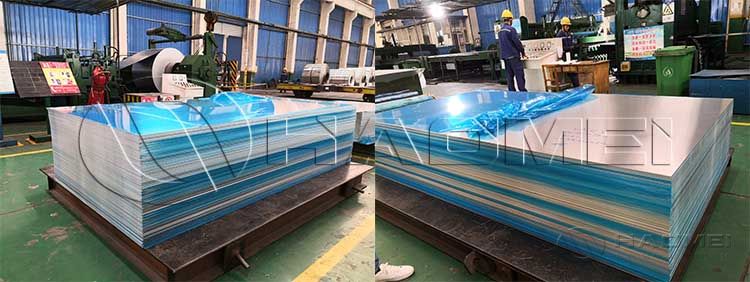The aluminum sheet thickness standard refers to the thickness range of the aluminum plate determined according to certain specifications during the production and application of the aluminum plate. Aluminum plates are widely used in construction, automobile manufacturing, electronics, aerospace and other fields. Therefore, determining the aluminum plate thickness standard is of great significance for ensuring product quality, promoting technological innovation and improving industry development.
The thickness of aluminum plate has a great influence on physical properties, including strength, toughness, and compressive resistance. Generally speaking, the thicker the aluminum alloy, the better the physical properties. However, if the thickness is too large, it will affect the processing performance of the aluminum plate.

Common measurement methods include hand measurement, caliper measurement, optical measurement, etc. Among them, optical measurement is a high-precision measurement method that can meet the measurement needs of high-precision aluminum sheets.
On the one hand, the thickness standard of aluminum plate is directly related to the stability of product quality and function. Qualified aluminum plate thickness can ensure that the mechanical properties, corrosion resistance and processing performance of the product meet the design requirements, and ensure the stability and reliability of the product during use. On the other hand, the formulation of aluminum plate thickness standards is also an important driving force for the continuous innovation and development of the aluminum industry. Accurate thickness standards help aluminum sheet manufacturers improve product quality, reduce costs, and promote technological progress.
The commonly used aluminum sheet thicknesses are 0.1mm, 0.2mm, 0.3mm, 0.4mm, 0.5mm, 0.7mm, 0.8mm, etc. Normal pipe insulation aluminum sheet can not be too thick. Aluminum sheet 0.5mm is a common choice, the width is 1 meter. Small rolls are commonly used, each roll is about 50 meters, and two people can lift it for easy operation.
The popular alloys are 1050, 1060, 3003, 3a21,etc. Among them, 1060 pure aluminum sheet or coil is basically chosen by 80% of the projects, and 3003 aluminum sheet, as an aluminum-manganese alloy, is mostly used in projects with high anti-corrosion requirements and relatively large corrosive environments, such as chemical plant desulfurization and insulation projects. You can choose according to your own project situation.
The polykraft laminted aluminum coil is also a product that has just emerged in recent years. Generally, it is used more by foreign users, especially in the Middle East. The thickness is generally 0.2-2.0mm and the width is between 800-1300mm. The alloy generally uses 3003, 3004 and 5052.
The biggest benefit of aluminum PCB sheet is its excellent heat dissipation capability, which transfers heat through the aluminum layer and quickly cools the components, thereby improving the overall performance of the final product. The thermal conductivity of PCB aluminum sheet s mainly achieved through the aluminum layer. Although there are many thicknesses to choose from, the most commonly used thickness is the aluminium sheet 1mm.
Original source: https://www.alumhm.com/a/how-will-the-aluminum-sheet-thickness-affect-its-properties.html

没有评论:
发表评论